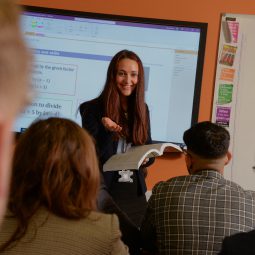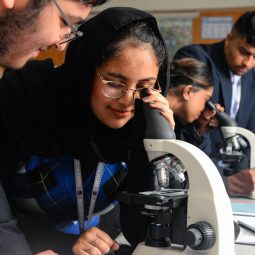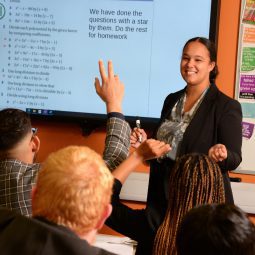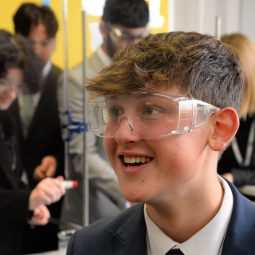Further Maths
A level Further Mathematics (AQA)
Further Mathematics best supports students wanting to take a Mathematics, Physics or Maths/Science based degree. You will study Pure Mathematics in depth, covering topics that could be in the first year of a mathematics degree and will broaden the breadth and depth of the applied areas.
We also offer STEP Mathematics for those students who want to further their love and enthusiasm for maths through tackling less structured and more problem solving questions.
Course Content & Assessment
Pure Mathematics (two thirds of the course):
Students will study all of the following topics: proof, complex numbers, matrices, further algebra and functions, further calculus, further vectors, polar coordinates, hyperbolic functions, differential equations, trigonometry and coordinate geometry.
Applied Areas (one third of the course):
Two of the following areas
- Statistics (one sixth of the course)
The topic areas in statistics are discrete random variables and expectation, poisson distribution, Type I and Type II errors, continuous random variables, Chi tests for association. - Mechanics (one sixth of the course)
The topic areas in Mechanics are dimensional analysis, momentum and collisions, work, energy and power, circular motion, centres of mass and moments. - Discrete (one sixth of the course)
The topic areas in Discrete are graphs, networks, network flows, Linear programming, critical path analysis, game theory for zero-sum games and binary operations and group theory.
Assessment:
A Level Further Mathematics is examined over 3 separate exams which are all sat at the end of the 2 year course.
Each exam is 2 hours long and requires the use of a calculator.
The first 2 exams are compulsory units and are entirely assessing the Pure Mathematics content.They are both worth 100 marks each.
For the third exam you will be taught and examined on just two of the following three applied areas: Mechanics, Discrete and Statistics.
This third exam will be made up of 2 papers (one on each area) and will be worth 50 marks each. You will be expected to answer every question and the exam will require the good use of a calculator and therefore we will recommend which calculator you use.
Your calculator must include the following features: an iterative function and the ability to compute summary statistics and access probabilities from standard statistical distributions.
Teaching
The classes will be smaller than GCSE, on average about 15 students.
There will be many challenging activities, opportunities to work in groups, use of ICT, activities that test a deeper understanding and consolidation exercises.
There is more emphasis on working independently and you will be expected to regularly attend study support at lunchtimes.
Your Future
A recent report by the Centre for Economic Performance said that young people with A Level Further Mathematics earn ten percent more than their Mathematically challenged counterparts. A shortage of highly numerate candidates in the jobs market means employers pay a premium for problem solving and number crunching skills of A Level
Further Mathematicians. Further Mathematics A Level would be applicable for many courses and careers, such as Mathematics, Physics, Engineering, Computing, Accountancy.
Moreover, these experiences in the broad range of mathematics, ranging from pure mathematics through to applied areas, will undoubtedly give you a strong foundation on which to pursue a mathematics degree or a mathematical based degree at a prestigious university.
The Blue Coat Sixth Form is proud to be part of the Cranmer Education Trust
Cranmer Education Trust is a company limited by guarantee and an exempt charity registered in England. Company registration number: 07687709. Registered Office: Cranmer Education Trust, c/o The Blue Coat School, Egerton Street, Oldham OL1 3SQ. The website address is www.cranmereducationtrust.com and the phone number 0161 785 5082.









